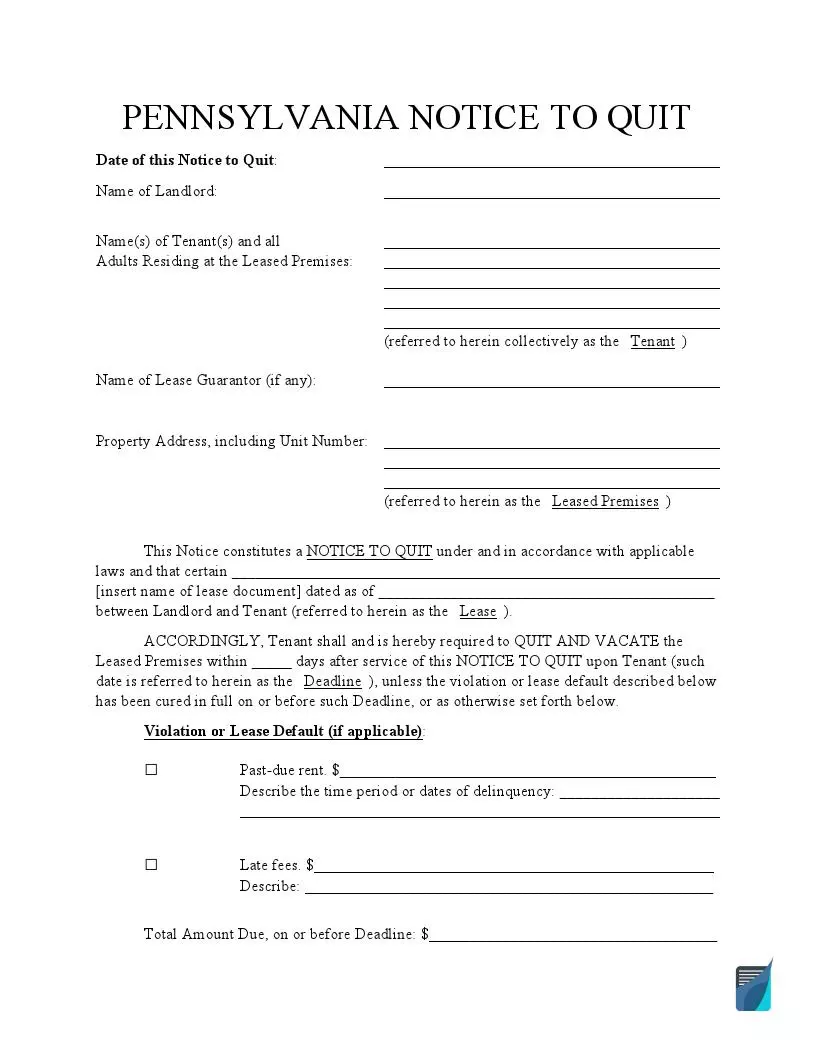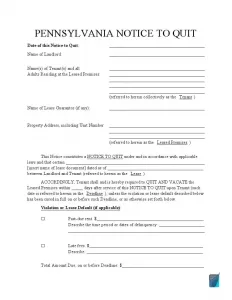Pennsylvania Eviction Notice Forms
When the landlord and the tenant sign the residential rental agreement, they create a binding legal contract. Naturally, both parties agree to follow this contract and should do so to avoid penalties and other issues. Pennsylvania eviction notice templates provide the structure of the written forms that landlords in Pennsylvania send to the tenants who are not obeying the rules of their agreement.
Any substantial breach of the rental agreement can lead to eviction. Sometimes situations escalate, and the parties fail to resolve the issue without legal support. In such cases, the tenant proceeds to fight for the eviction of the tenant in court. For the tenant, a court process may be challenging and very difficult to win, usually because the landlords proceed from eviction notices to actual court applications only when it is clear that the matter is serious and the tenant is not considering fixing the issue. It is always better for both parties to settle the matter between themselves. It is sometimes achievable after the tenant receives the first eviction notice, but it depends on the individual case.

Build Your Document
Answer a few simple questions to make your document in minutes
Save and Print
Save progress and finish on any device, download and print anytime
Sign and Use
Your valid, lawyer-approved document is ready
Pennsylvania Eviction Laws
In Pennsylvania, separate acts govern eviction procedures. The Landlord and Tenant Act (1951) describes the regulations concerning the eviction process. The landlord typically uses their right to give notice in the following circumstances:
- When the period of lease is coming to an end
- If the tenant has breached the conditions of the lease
- If the tenant has not paid rent in time
The last scenario is one of the most common reasons for eviction. In these cases, the landlord gives the tenant 10 days to try to fix the issue, namely, to pay the outstanding amount of rent. Often the problem becomes resolved when the tenant finds a way to give the remaining money to the landlord. Sometimes the landlord has to take the matter to court.
Non-payment of rent is not the only issue that makes landlords create an eviction notice template. The tenant may breach the terms and conditions of the lease agreement. The landlord often does not find it out immediately, but as soon as they do, they should deliver the notice to the tenant. These issues usually have to do with either the tenant having more people living in the property than it has been agreed (unauthorized occupants) or them having a pet in a strictly no-pet property, for example.
The landlord’s notice should prompt the tenant to fix or “cure” (as it’s often called in legal documents) the issue. If they cannot do so, the landlord can go to court.
The state of Pennsylvania advises the landlord to call the tenant to discuss the breach. The landlord should deliver written notices by mail.
Pennsylvania Eviction Notice Laws Details
| Rent Grace Period | Not specified |
| Notice of Non-Payment | 10 days |
| Notice of Non-Compliance | Not specified |
| State Laws | Pennsylvania Statutes, 1951 Act 20, Article 5 |
Eviction Notice Types Used in Pennsylvania
A Notice of Lease Termination (for a Month-to-Month Lease)
If the parties have a month-to-month lease agreement, they usually agree that one of them notifies the other about the terminations of the contract one month or at least 15 days in advance.
A Notice to Quit (for Non-Payment of Rent)
Many cases of non-payment of rent get resolved because the landlord gives the tenant a 10-day notice to vacate the apartment or pay the rent the tenant owes them. If the tenant agrees and pays the money, the landlord does not have to go to court.
A Notice to Quit (for Non-Compliance with the Lease)
Some lease breaches have to do with the tenant breaking the terms they have agreed to in the lease. The state of Pennsylvania recommends the landlords to allow 30 days for the tenant to address the question.

Eviction Process in Pennsylvania
- Mail the Notice
This stage may solve the issue without the landlord needing to go to court if the tenant agrees to eliminate the problem.
- File the Complaint
If the notice has not led to the tenant resolving the issue, the landlord goes to court.
- Wait for the Judgement
The tenant will be given a chance to explain themselves.
- File for a Writs of Possession
The landlord, if the judgment was in their favor, may need to get assistance in evicting the tenant. Pennsylvania forbids the landlord to take possession of the property for a minimum of 21 days and without the Writs of Possession.
Eviction Court Forms
- Summons for Rent Non-Payment
The tenant receives the summons when they are asked to appear in court because they have not satisfied the demands of the notice they have received from the landlord for non-payment of rent.
- Summons for Non-Compliance with Lease
The tenant will be summoned to court for a hearing if they have not solved their lease non-compliance breach.
- Writs of Possession
This type of form instructs an officer to assist with effective enforcement of the eviction process.

Interested in some other Pennsylvania templates? We offer free templates and straightforward customization experience to everyone who prefers less hassle when handling paperwork.
Other Eviction Notice Forms by State
